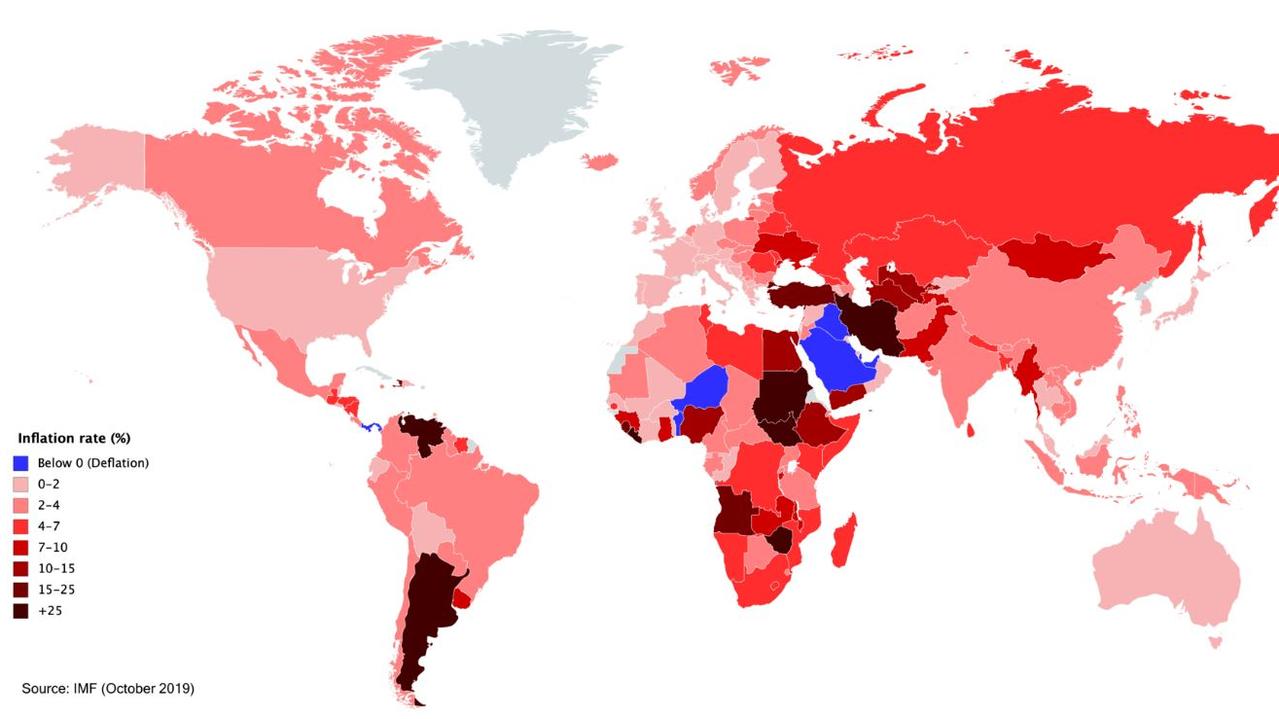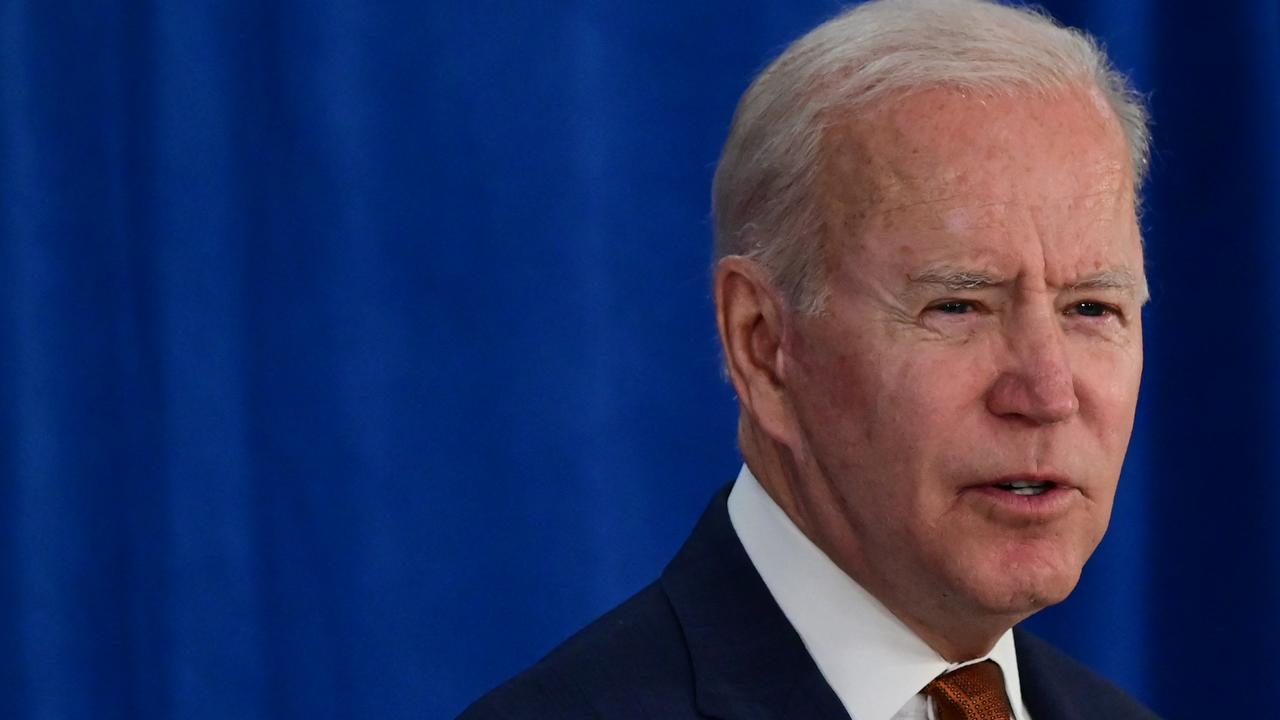Deutsche Bank warns the global economy is ‘sitting on a time bomb’
The world is on course for a devastating economic event that will hit every corner of the planet, a leading bank has warned.
The global economy is on course for a “devastating” rise in inflation in the next few years that will hit every corner of the Earth, Deutsche Bank has warned in a stark new report.
It says the world is going thorough its biggest shift in direction in 40 years in terms of economics and that it could lead to levels of inflation, in just a few years, that would wreak havoc with our lives.
Inflation – the increase in prices of the goods and services that we all buy – has for decades now been seen as the bogeyman of the economic world.
When the prices of everyday stuff like bread and petrol goes up, people tend not to be happy about it. History has shown us that when it spirals out of control – as it did in the years before the Nazis came to power in Germany – things can get out of hand pretty quickly.
Former US president Ronald Reagan summed up this fear by describing inflation “as violent as a mugger, as frightening as an armed robber and as deadly as a hit man”.
As a result, economies around the world have worked hard to keep inflation down.
RELATED: The jobs that will pay you $200,000

That is, until now.
In its report this week, Deutsche Bank says the financial institutions of the world have now fundamentally shifted their perspective.
As many of us have done individually over the course of the pandemic, they say global powers have reflected on what they believe is really important.
Deutsche says that instead of fearing debt and inflation, major economies like the US, and even more prudent nations like Germany, are more concerned about trying to make our lives better by achieving “social goals”.
Their economists welcomed the initiative of governments to improve the lives of their citizens – particularly when we’ve had such a rough go of it during the pandemic.
“Such goals are as necessary as they are admirable,” Deutsche’s chief economist, David Folkerts-Landau, and others wrote.
“They include greater social support for minority groups, greater equality in income, wealth, education, medical care, and more broadbased economic opportunity and inclusion.
“They should be front and centre of the policies of any government in these times.”
However, the bank’s economists warned this came with a downside.
They say that, to fund this full and inclusive recovery, central banks like the USA Federal Reserve will tolerate higher inflation and nations around the world will be happy to take on even more debt.
“The pandemic has accelerated this shift in thinking,” they said. “Sovereign debt has risen to levels unimaginable a decade ago with large industrial countries exceeding red-line levels of 100 per cent of GDP.
RELATED: Who will miss out on future pay rises

“Yet, there is little serious concern about debt sustainability on the horizon from investors, governments or international institutions.”
Similarly on inflation, they say the vast majority of central bankers and economists believe any rise in prices away from the historically low levels of the last decade will be a flash in the pan.
Grave concerns as inflation ‘re-emerges’
However, the economists at Deutsche believe this attitude is dangerous and they have grave concerns about what will happen in the next few years if inflation continues rising.
“We worry that inflation will make a comeback,” they warned. “Few still remember how our societies and economies were threatened by high inflation 50 years ago.
“The most basic laws of economics, the ones that have stood the test of time over a millennium, have not been suspended. An explosive growth in debt financed largely by central banks is likely to lead to higher inflation.
“We worry that the painful lessons of an inflationary past are being ignored by central bankers, either because they really believe that this time is different, or they have bought into a new paradigm that low interest rates are here to stay, or they are protecting their institutions by not trying to hold back a political steam roller.”
They warned it may take until 2023 but inflation “will re-emerge”.
“While it is admirable that this patience is due to the fact that the Fed’s (Federal Reserve) priorities are shifting towards social goals, neglecting inflation leaves global economies sitting on a time bomb,” they said.
“It is a scary thought that just as inflation is being deprioritised, fiscal and monetary policy is being co-ordinated in ways the world has never seen.”
They warned the consequences will be devastating for everyone on the planet – particularly, and ironically, the most vulnerable people the new economic policies were designed to benefit.
“Rising prices will touch everyone. The effects could be devastating, particularly for the most vulnerable in society,” they said.
RELATED: Shock amount Aussies borrowed for homes

“Sadly, when central banks do act at this stage, they will be forced into abrupt policy change which will only make it harder for policymakers to achieve the social goals that our societies need.”
Politically difficult to make necessary economic policy changes
They said that when central banks are eventually forced to act on inflation, they will find themselves in a difficult, if not untenable, position.
“They will be fighting the increasingly ingrained perception that high levels of debt and higher inflation are a small price to pay for achieving progressive political, economic and social goals,” they said.
“That will make it politically difficult for societies to accept higher unemployment in the interest of fighting inflation.
“Low, stable inflation and historically low interest rates have been the glue that have held together macro policy for the last three decades.
“If, as we expect, this starts to unravel over the next year or two, then policymakers will face the most challenging years since the Volcker/Reagan period in the 1980s.”
Deutsche’s grim outlook is not widely accepted. The majority of economists agree with the Federal Reserve’s view that current inflation pressures that many parts of the world are seeing now will pass.
Jan Hatzius, chief economist at Goldman Sachs, told CNBC there are “strong reasons” to support the position.
The US economy has a knock-on effect for the rest of the world and he believes it will pick up when enhanced unemployment benefits there end, sending workers back to their jobs in the coming months.
“All this suggests that Fed officials can stick with their plan to exit only very gradually from the easy current policy stance,” he said.




